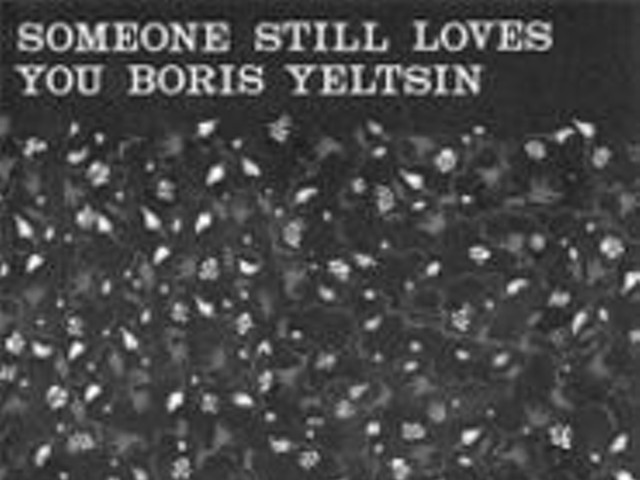But what about the work itself? For the sake of argument, indulge this scenario: Kelly, eager for a little bump 'n' grind, arranges to meet an aspiring backup singer at his Chicago mansion just before kicking off his 2005 "Sex in the Kitchen" Tour. The fly excitedly hurries (read: gets a ride from her cousin) to the spider's web. Our hero paces in his velvet robe, sipping Courvoisier from a kitten's skull fashioned into a chalice. He is informed that his guest has arrived. In a frenzied effort to look calm and well-read, Kelly leaps onto his burgundy leather gentleman's chair and randomly grabs a book from the neglected shelf. He cracks its virginal spine and accidentally reads one and a half pages of an O. Henry short story! The rest is history.
"Trapped in the Closet" is Kelly's latest single, and it doesn't fuck around: There's no chorus, no spoken-word bullshit and barely an intro. Kelly wakes up in a strange woman's bed. Her husband is coming up the stairs. Kelly and the woman frantically discuss what he can do (in a brilliant sequence where Kelly rhymes "fifth floor" with "window.") As the title suggests, R. gets in the closet, but not before singing "Shit!/Think!/Shit!/ Think!/Shit!/Quick, put me in the closet."
But then his cell phone goes off!
The husband, of course, hears the cell phone and begins to look for the other man. He looks behind the door and under the bed. Understandable. Then the shower. A little strange, but reasonable. Then the closet, right? No! Under the dresser. Obviously, this guy isn't a detective, or he owns the biggest dresser in the history of all dressers. Finally he starts making his way to the closet. He comes closer, closer, closer to the closet. Kelly pulls out his Beretta.
He has a Beretta? What's the problem, man? You have a gun. Game over. R. Kelly wins. But no, he's still in the closet. I can't take it anymore! The man gets closer and closer to the closet! Oh my God, R., run!
Then the song abruptly ends. Did he get caught? Did he shoot the husband? I rush to Google and punch in "Trapped in the Closet" to put the puzzle together. It turns out this is part one. Of five.
Maybe Kelly's been reading Tolkien, too. -- Kyle Reiter
Anger Management
In a recent New York Times article that disputes the age-old link between creativity and depression, author Peter D. Kramer claims that it is "depression -- and not resistance to it or recovery from it -- that diminishes the self." Devoted acolytes of Nine Inch Nails majordomo Trent Reznor would heartily disagree with such a statement -- especially since the 39-year-old has always seemed personally empowered by despair and alienation. He's a black-clad Superman embodying Kramer's assertion that in some circles "melancholy is heroism."
Certainly Reznor's larger-than-life mythology of bleakness appears to insulate him from any fan backlash. In fact, the six-year gap between 1999's The Fragile and the new With Teeth has only increased interest in his enigmatic world. NIN's current small-venue U.S. tour sold out within minutes -- with tickets now fetching hundreds of dollars on eBay -- and the band is closing this year's prestigious Coachella Festival with a Sunday-night headlining gig.
Yet there's something to be said for the concept of despair weakening artistic drive. Initially, The Fragile was a musically absorbing two-disc set. But these days, the sprawling album sounds like the very embodiment of depression as a mental prison: unfocused and littered with frustrated and aimless expressions of confusion, anger and uncertainty.
It's both a relief and a surprise, then, to hear how driven Reznor sounds on With Teeth, despite the usual abundance of self-doubt and regret. The disc isn't quite as nihilistic or nerve-fraying as 1994's The Downward Spiral, but the two albums share an affinity for radio-ready hooks.
Teeth's concessions to tradition are done without compromising any harshness. "Getting Smaller" explodes with a refrain that's practically a note-for-note re-creation of the chorus to the Pixies' "Planet of Sound." The gothic keyboard sine waves on "Only" resemble Ministry's darkwave synth-pop origins. "All the Love in the World" even dabbles in industrial's descendent, glitchy IDM electro and crescendos into a surprisingly dance-floor-friendly throb replete with falsetto coos and an untz-untz breakdown.
But Teeth makes its greatest strides in the way that Reznor reacts to his ever-present demons -- by questioning their presence instead of feeling trapped by them. This isn't an unprecedented move for him. While Ian Curtis seemed reconciled to impending doom on Joy Division's "Dead Souls," NIN's version of the tune from the Crow soundtrack fought the bony grasp of the underworld, kicking and screaming the entire way.
Back then, however, he was "too fucked up to care anymore" (on Fragile's "Somewhat Damaged") or lamenting that "it's too late for me" (from that album's title track) to fix his problems. But now, Reznor sounds like someone who's just achieved conscious clarity after awaking from a long nap -- someone suddenly thrust from blindness to sight, reverse-Oedipus style -- and is really pissed off at what he sees.
Either metaphorically or abstractly, NIN covers the same topics as most pop artists -- love, sex, obsession and pain. But instead of wrapping his songs in coy phrases or veiled obsessions, Reznor will just come right out and say, "I want to fuck you like an animal" or "I hurt myself today." He's nothing if not blunt.
Confusing the singer with the content of his songs is always a dangerous proposition. But there's definite fascination in studying someone who is drawn to the brink of the bottomless abyss but avoids freefalling into nothingness every time. There's always the nagging thought, "Is this the time he actually jumps?" -- and a silent cheer when he returns every time, buoyed by danger.
Kramer's article notes that "superficially, mental pain resembles passion, strong emotion that stands in opposition to the corrupt world." Reznor's passion is mental pain -- but With Teeth proves he's nearly perfected the art of sublimation. -- Annie Zalenski





